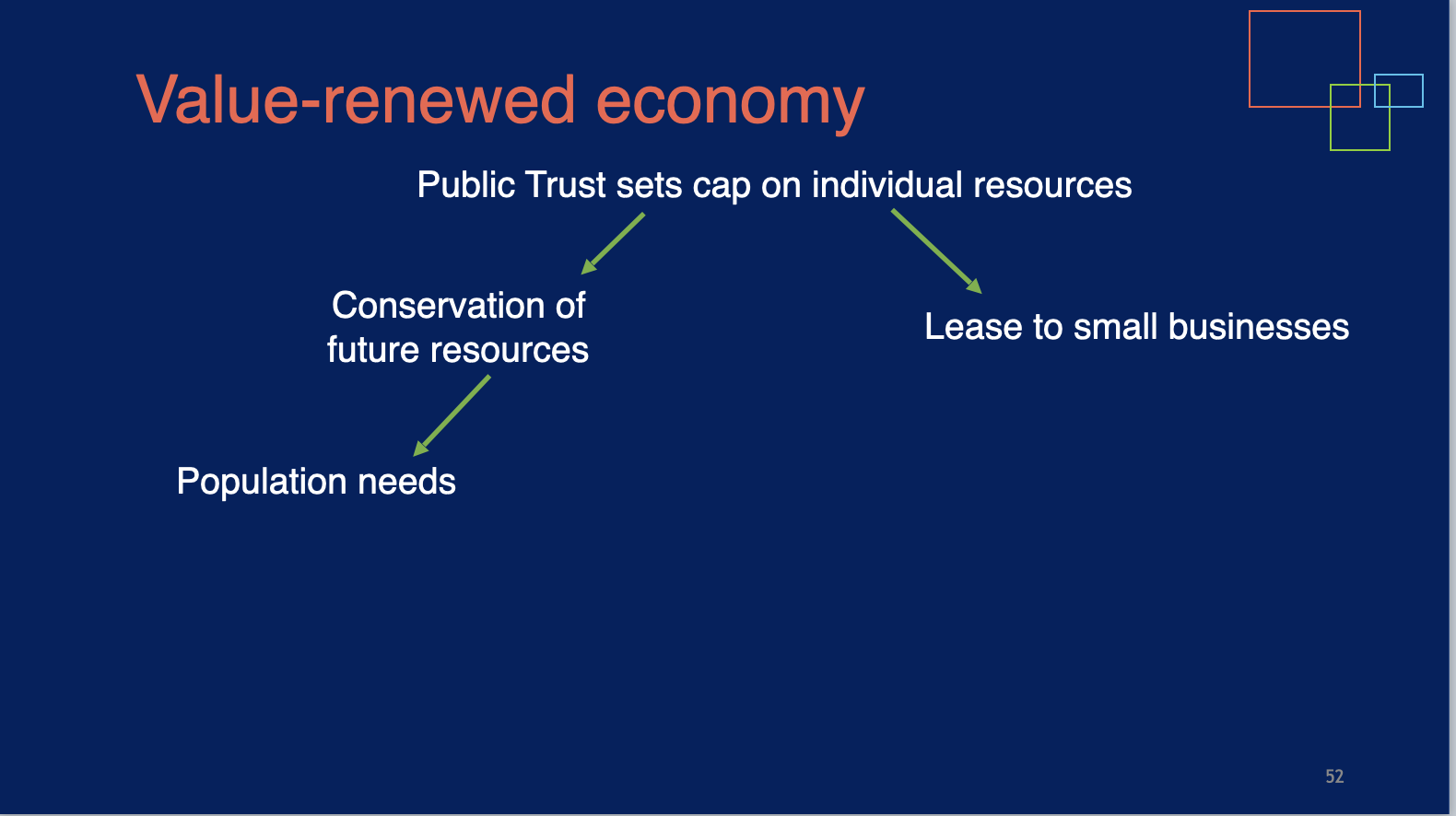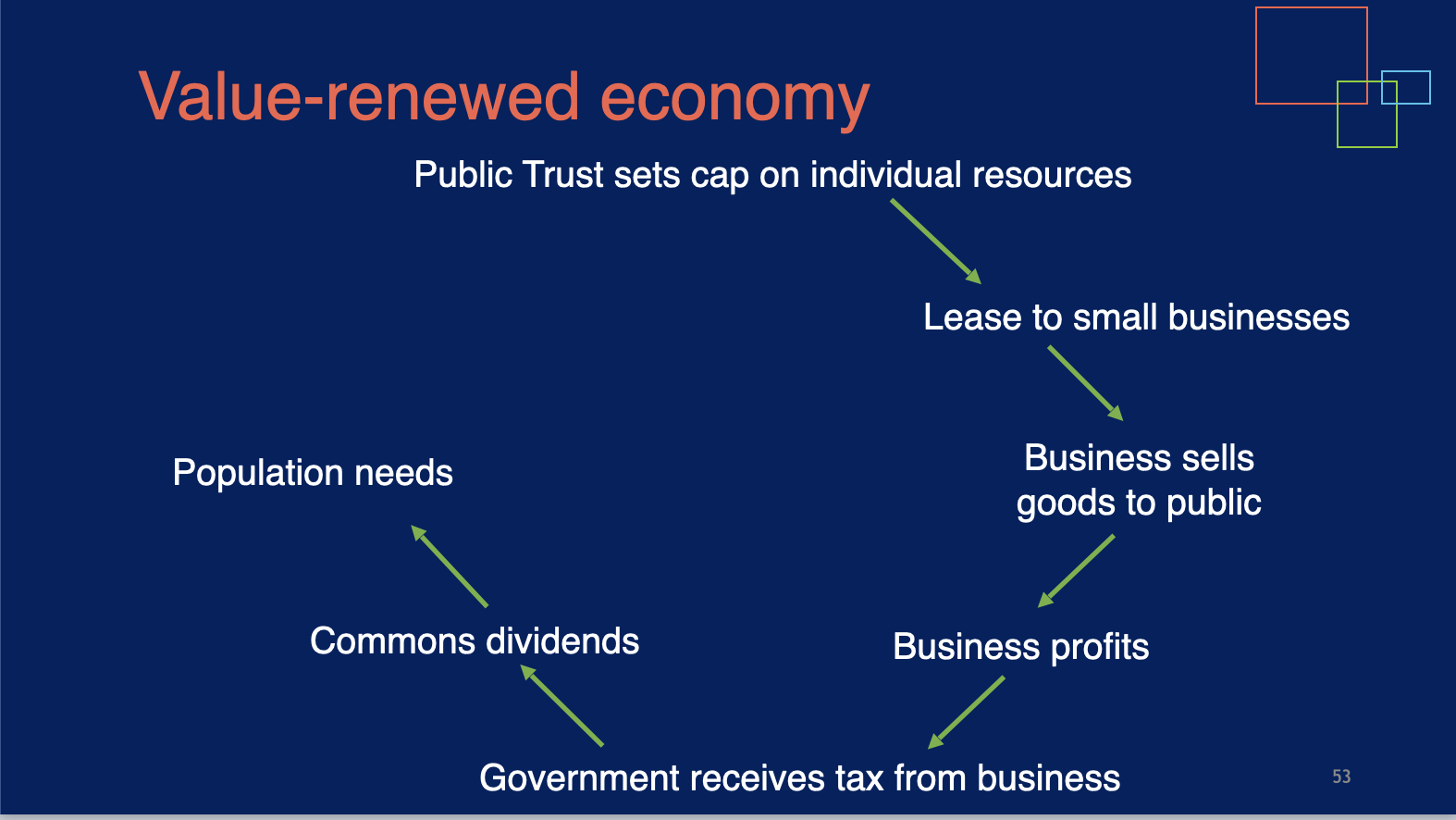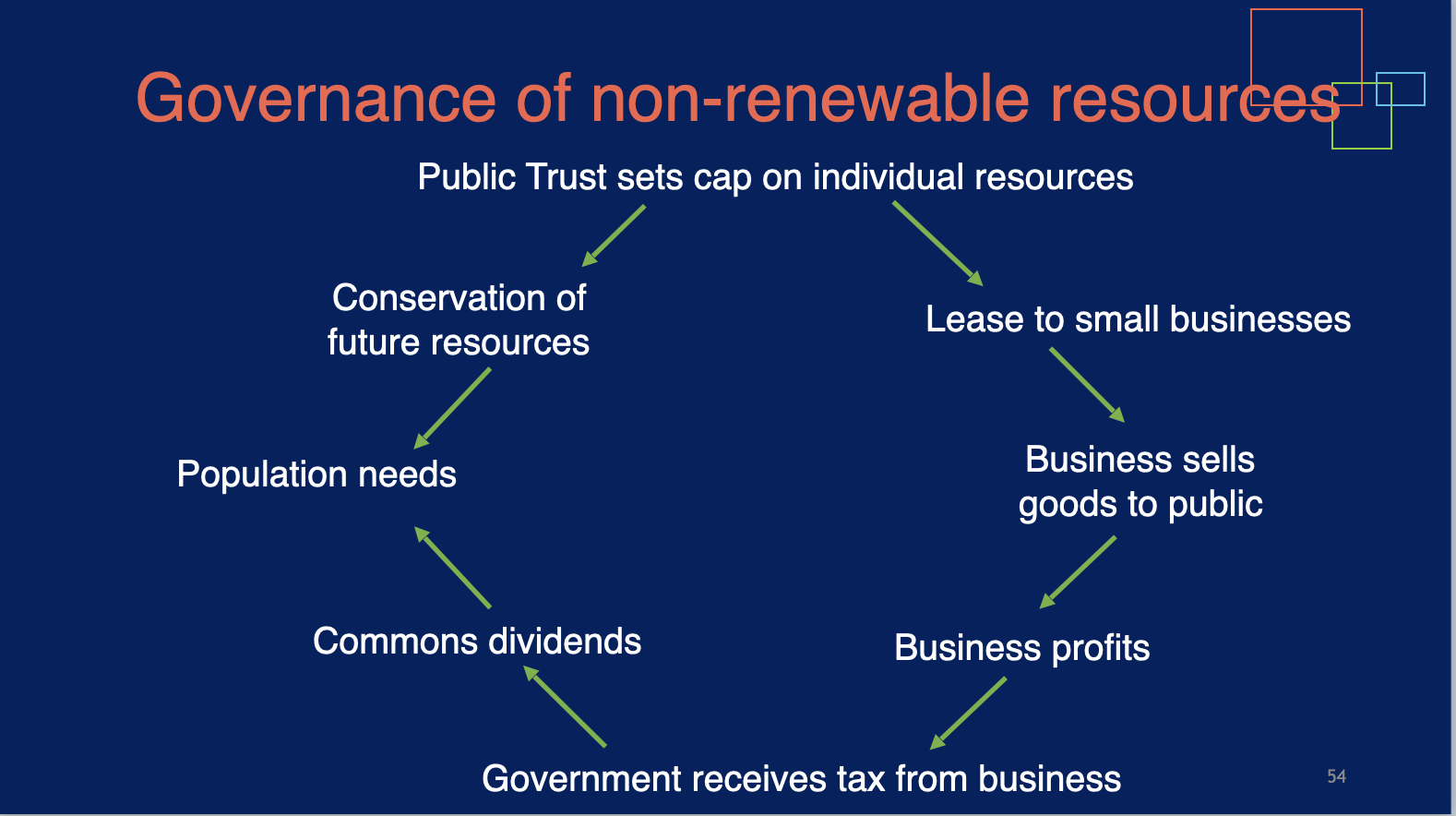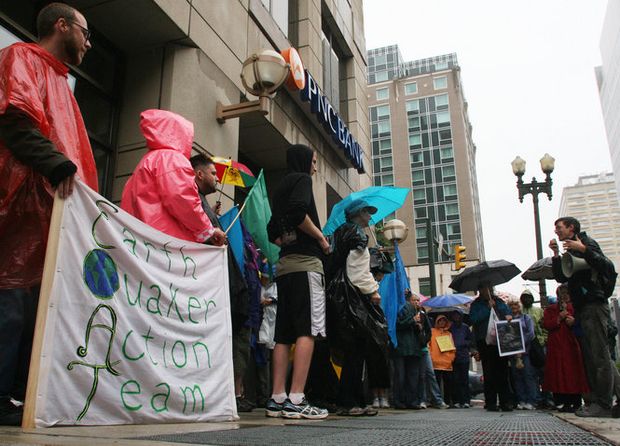The Value-Renewed Society
Burning Questions
The world has been fascinated by the windswept images of Mars that are periodically transmitted by NASA’s Exploration Rovers, Spirit and Opportunity. Perhaps, as we study the video of the terrain and discern how this desolate planet lost its water eons ago, it helps take our minds off the searing climatic conditions that we face at home.
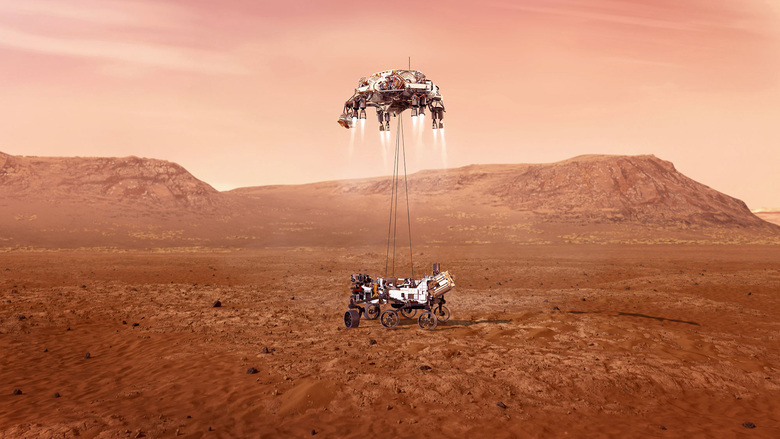
Since the exploration and colonization of the Western World in the 16th-17th centuries, the dominant worldview has been that our planet’s resources have few limits. Modern societies never bothered much with the systemic differences between renewable and non-renewable resources — after all, nature seemed boundless in its capacity to meet the needs of every population on Earth
The distinction between renewable and non-renewables was left for science to examine. The nascent field of economics was focused more on measuring the endless supplies of the commons, justifying the conquest and exploitation of the new territories and rationalizing the oppression of human labor to keep the business of resource development moving ahead.
After the Second World War, the West insisted that multilateral trade was the gateway to world peace; but all we hope for now is that trade will insulate us from a world which still finds itself at war over its commons. An observer visiting us today from Mars might define homo sapiens as “the race which has perfected its intelligence to fight over, consume and waste its material resources”.
Indeed, we have outsourced our hopes and dreams to the market economy. Wealth is our purpose. Prices our values. Ownership trumps sharing. Property is happiness. Human self-actualization lies in the magic of the marketplace.
Despite variations in their details, a single thread runs through classical, neo-classical and Keynesian economics, as well as ‘economics with Chinese characteristics’. Today’s governments and corporations still operate from the playbook that resource supplies are infinite, yet know very well that they are running down. This is because economics has taught our officials that the wealth arising from a financial yield in production or investment is more valuable to people than an organic yield from nature.
Of course, we could explain to our Martian visitor that we simply inherited this formula from our ancestors. We could say that we are not responsible that the indigenous wisdom for replenishing our shared resources has been neglected in our current social planning and policy.
Maybe the most honest thing we could say is that in a world without resource limitations, what we have done during the last five hundred years seemed like the most efficient course of action — that it all made sense at the time. But willful ignorance does not explain why we still haven’t found a way to admit our mistakes and commit ourselves to regenerating the commons and satisfying the needs of everyone in society.
Instead of going to bed at night dreaming of mining the minerals on Mars or finding some new pool of water on an asteroid, we need to ask ourselves some burning questions about our vision of life on Earth:
- Why do governments and corporations continue to believe that adding value to our commons through prices and investment will finance solutions for climate change, environmental deterioration or social inequality?
- How long do we have until the high cost and low marginal returns on extracting value from food, water, energy and technology causes our economies to collapse because they have no systemic way of renewing the commons?
- Is it possible that human civilization could replenish the planet, redevelop our economies and maintain high levels of social complexity by taxing the value that we take from our commons?
At an Earlier Turning Point in History
Anthropologists describe a major economic shift that occurred early in the agricultural age. When farmers turned from cultivating food by hand to using cattle to plow their fields, it changed the way that agriculture was produced.
The benefits were startling: by harnessing cattle (energy) to huge plows (technology), food could be grown at scale and at lower cost. Efficiency became the key in agricultural production, necessitating a new category of economic value to account for this transformation. The word ‘cattle’ evolved into the word ‘capital’, signifying this change for the ages.

It was a fateful development in human society. This was the point at which agro-cultures adopted a system of accounting that was entirely different from the practice of carrying capacity, which matched the availability of local resources with the needs of local people. Rather than an economy based on the biophysical distinction between renewable and non-renewable resources, civilization now began to make a socioeconomic distinction between use-value and exchange-value.[1]
When the use-value of individual farming was supplanted by the exchange-value of agriculture driven by cattle and plows, it changed how people know and experience the worth of their things. The significance of this historic turn has been discussed by many analysts, from Aristotle and Adam Smith to Karl Marx and Karl Polanyi.
Use-Value: What We ADD to the Commons
What does it mean to add value to the commons? Consider all the goods and services that we utilize and appreciate. Many things that we extract or produce from nature serve a useful purpose by enriching our experience and making life easier. Within the field of economics, every product that has practical qualities and satisfies some personal function or need is said to have utility or use-value.
Use-value is associated with economic freedom. As a highly active and creative species, human beings express free will and self-determination through the things we decide to use. And in using these things, we are also likely to take care of them to keep them functional.
Thus, the practical utilization of a good or service may engage both our creative power and sense of responsibility. It may even lead to the realization of our higher potentials, like the use of material or natural resources for the betterment of society. In transforming matter or energy into a useful product, or in protecting or maintaining this product, we are adding value to the commons.
This is why many individuals are motivated to be productive, to own and operate their own businesses and profit from their work. Use-value adds significance to the resources that we use by optimizing their present utility, although this does not necessarily mean that we are sustaining their utility for future generations.
Exchange-Value: What we TAKE from the Commons
Here’s where it gets complicated. When the energy-intensive labor of cattle and the efficient technology of the plow replaced the plodding farmer with a simple hoe, it began a new era in the way that human civilization creates and manages money. For the first time, people began to value some things more for their cash value than for their utility.
Thus, a personal item is perceived to lose the quality of use-value when it is removed from the commons and compared or exchanged with other commodities through its pricing in the marketplace. This new way of accounting was institutionalized as exchange-value, while practical use-value was relegated to secondary status in society.[2]
Exchange-value measures the marginal returns on capital rather than the sustainable yield of natural resources. From the standpoint of exponential growth and market efficiency, exchange-value is often seen as ‘generative’ in its ability to amass capital. But to the extent that exchange-value ignores the naturally generative growth of use-value, this exponential form of increase is not sustainable at all. The underlying reason for this misvaluation is not surprising: economics is not paying attention to science.
The fungibility created by exchange-value completely blurs the biophysical distinction between renewable and non-renewable resources. For example, agriculture and fossil fuel are lumped together in the same system of value because both are traded in the marketplace for a price. Yet food and oil represent entirely different forms of material value, which are either regenerative or exhaustive by definition (see the Periodic Table of the Elements or Chemistry 101 for a refresher course on what endures and what doesn’t).
Instead of adding value to the commons, at every step of the modern chain of exchange value individuals are ‘adding value’ for themselves — from extraction, production, marketing and sales to distribution, consumption and waste. SEE FIGURE 1 We have been trained to think of this system as beneficial because it creates prosperity for those who are involved, directly or indirectly, in this modern economic chain.
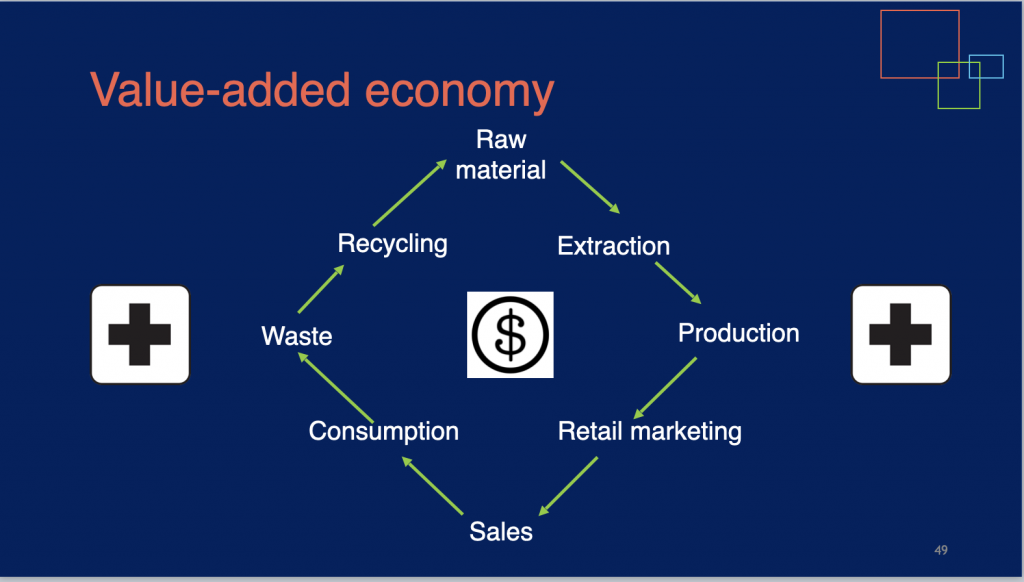
Yet how much of this value-added activity goes back into the regeneration of our commons or allocates distribution in society? Very little. Our financial and social chains are not designed to recirculate resources in an ecological way. While use-value may add some worth to the commons on an individual basis, the algorithms for exchange-value are not designed to renew nature or create equitable distribution in society. Rather than add value, exchange-value actually subtracts value from the environment and from people.
Transforming the Tax Structure to Regenerate the Commons
This raises broader questions:
- Why have societies become so adept at producing resources while their distribution and replenishment are failing?
- Why isn’t the value that is taken from the commons directed into meeting human needs and restoring the resources to meet those needs?
- Why aren’t public officials quantifying the fundamental differences between renewables and non-renewables as an expression of their use-value?
Volumes could be written on how modern governments have not been accountable to their people. The climate emergency makes this problem even more pressing. During the past several decades, the dysfunction of the ancient system of use-value and exchange-value has been thoroughly exposed. Since 1970, as global population demand began to exceed the planet’s resources, there has been no way to manage this shortfall because we have no tools for measuring it, no means of financing a solution for these resource deficits, and no direct way of reversing the practices of business and government which are causing the crisis.[3]
Why has this happened? Through use-value, we add value to the commons through labor, care, and local management of our possessions. Use-value can easily distinguish the difference between resources that are renewable and those that are not — we simply use them differently. The problem is that the original meaning of use-value — a simple appreciation of the items that we like — is not taken seriously by our social and economic institutions, except for boosting these ‘likes’ into exchange-value.
Consider what happens when society taxes the value that we add to the commons, like the sales tax that we pay on food at the supermarket. This is a value-added tax that goes to a governmental district rather than the people who produced the food. It makes little sense to tax use-value because customers are being charged twice for the same item — the cost of the product as well as the sales tax. And following this, the revenue from the sale goes directly back to the businesses and governments and is rarely reinvested in society or ecology.[4]
On the other hand, the convention of using exchange value to measure our commons encourages us to emphasize the production of resources into commodities. It leaves the distribution and replenishment of resources to the discretion of policy makers, allowing these egalitarian measures to flounder from limited legal requirements or enforcement. This is why ecological preservation and the redistribution of resources are so controversial in the modern market economy: they require financing from a value-added surplus, which is left to the prudence of individual and corporate philanthropy or public taxation.
We are proposing a major shift in the way that governmental taxation is structured in modern economies. We suggest a way of structuring the assessment and appropriation of taxes that is based on the dynamic flow of both renewable and non-renewable resources from their creation/extraction to their waste and recycling.
A Commons World is Probable
Commons must be taxed according to whether they are renewable or non-renewable.
The practice of separating renewable and non-renewable resources only after they are consumed and discarded as waste, which many of us follow faithfully, has led to declining marginal returns in society’s investment in social equality and sustainable resources. Assigning an exchange value to material waste for the purpose of recycling is far too late in the process to create an equitable or sustainable economy; and in many cases, the trash has no cash value in the recycling market.
This has created the improbable solution of having to finance ecological renewal and redistribute resources from the surplus or supply-side of the economy, the implementation of which has twisted capitalist societies in knots. Political polarization over resource distribution and regeneration has made citizens vulnerable to declining biodiversity, shortages of arable land and freshwater, pollution, changing biogeochemical flows and the volatility of social and economic inequality.[5]
We need a different way to allocate resources. Commons must be taxed according to whether they are renewable or non-renewable. This is why we should begin thinking of taxes on the commons much earlier in the economic chain — not at the point of sale or the time of recycling, but before these resources are produced and distributed. If taxes are assessed at the point of resource extraction, they could be earmarked immediately for poverty alleviation, conservation or regeneration.
As long as governments view all resources as fungible commodities based on their exchange value, just as businesses do, we ignore what physics, chemistry and biology are telling us about powerful ways to address environmental deterioration and the provision of human needs in society. This is why citizens and government have a public duty to develop a system of appropriations that respects the intrinsic differences between renewable and non-renewable resources.
Tomorrow’s economies will require a full-scale, integrated system that restores natural resources and satisfies the needs of our growing population. In this new era of extreme climate change, biodiversity loss and growing scarcities of non-renewable resources, the taxes for funding distribution and sustainability must now become a function of value-renewed activities.
…we should begin thinking of taxes on the commons much earlier in the economic chain
Toward a Needs-Based Economy
While the field of ecological economics has attempted to model our economies upon natural systems, it has thrashed around trying to assign prices to ecosystems, applying the old use-value/exchange-value dichotomy. We have all heard the ideological claims that the market price system is a law of nature; that the overdetermination of the supply-side is a laissez faire expression of evolutionary balance; or that human need is actually reflected in the marginal utility of our individual wants.
Yet when we look to the biosphere for ways of providing for our needs, what is central is not the ecosystems themselves, but the fact that human beings who live in these ecosystems are organisms with an evolutionary intelligence that is already programmed deeply into our bodies. This is not use-value, but something deeper, far more biological, chemical and physical than utility.
This is why we are not suggesting that human society should return to an accounting system based on use-value but to the actual value of human need. Basing the economy on human need is the prerequisite for the recirculation of wealth in society.
Here’s why. Every cell in the human body constantly communicates with the brain about its needs, which triggers a process of protein synthesis to meet these material requirements. Each individual human body instinctively helps the mind to identify need, and then works to meet that need by activating the biology and chemistry of the body.
But there is no automatic process for meeting human needs in the modern social and economic system. Unlike the human body, which achieves its own forms of self-nourishment and self-organization, the biosphere does not define our needs or satisfy them for us. A life-preserving society can thrive within our biosphere only when the human mind quantifies and plans the specific requirements of food, water, sanitation, shelter and energy for people.
Both renewable and non-renewable resources require their own indices of valuation which are based on the relationship that human bodies have with the natural world to ensure the ongoing appropriation of these resources. So it’s up to society to define the symbiotic relationship between our bodies and the ecosystem in which we live. To sustain the lives of a given population, society must begin its accounting process at the point of resource extraction to match the availability of resources in an area with the needs of its people.
Thus, the funding for production, distribution and replenishment would be appropriated in advance so that society maintains the healthy metabolism of its habitat in the same way that any living organism — such as a human body — assimilates air, food, water and energy through its own individual parts. In this way, humanity becomes a collective body, within which each individual physical body is intrinsically connected and depends upon other physical bodies through their interrelationships.
Much attention today is focused on the sustainability of air, wind, oceans, potable water, agriculture, soil, plants, animals and energy. Supported with the right systems, it’s possible that renewable resources could become available to everyone, now and in the future. The goal would be for a regional community to match the yield of a particular resource with the people living in that area.
Vital as this is, the major attention given to renewable resources takes us away from the problem of non-renewable resources.[6] While there is much to say about the equitable and sustainable production and allocation of renewable resources, we will focus on renewable resources in another article. Below we examine non-renewable resources, which require a higher degree of management than renewables, precisely because they are scarce.
Managing Non-Renewable Resources
How would a value-renewed, needs-based society manage non-renewable resources? It requires a public trust that makes strategic decisions in coordination with business and government. This is a broad-based group of people who are given the power and authority to manage non-renewable resources in the public interest.
Their goal is to maintain a steady supply of these scarce resources for both the present generation and for future generations. Following is how this public trust would separate the future reserves from the present appropriations of non-renewable resources.
- SEE FIGURE 2 In its capacity as the legitimate representative of the people, the public trust sets a cap for each non-renewable resource in its area (for example, fossil fuels, arable land, water and other minerals), which preserves and guarantees a percentage of each resource for the future.
- The public trust agrees to lease the remaining portion of the non-renewable resource that is available outside of the cap to small businesses in the area.
- The income that the Public Trust receives from leasing non-renewables to businesses is invested directly back into financing the conservation of these resources for the future population.
- SEE FIGURE 3 The diverse business sector, comprised of individuals and small partnerships, produces and sells its product to the public.
- Businesses profit from their sales.
- Businesses pay a tax, based on their commercial development of the resource, to the government.
- This tax on businesses goes into the government’s Commons Fund. Because of the resource cap, this fund retains its monetary value through the guaranteed security of its reserve assets, which are scarce resources protected for the future.
- The government circulates personal dividends from this reserve fund to the public in the form of a Citizen’s Basic Income. This guarantees the people’s purchasing capacity and serves as a social safety net for meeting the needs of the population in the present.[7]
- Protecting a percentage of non-renewable resources under a cap (1., above), stabilizes the region’s monetary system. It allows each region to base its present currency value on the long-term value of the non-renewable resources that are preserved under the cap, which are treated as reserve assets. SEE FIGURE 4.
The Value-Renewed Society
Let’s sum up. By taxing the value that people add to the commons, our socioeconomic system has made us unconscious of our codependence with nature and our inherent empathy and compassion as organisms in relationship with other organisms. We need to recognize that ecological health and resource distribution cannot remain a function of adding value, redistributing a surplus or expressing demand in the marketplace.
Maybe we will learn something from the bleak photos that we are seeing now from Mars. Whether or not life existed there at one time, these glimpses of a water-forsaken landscape remind us how rare life is in the universe. Yet, for human beings on Earth, having reproduced successfully for countless millennia, people still take for granted how expert our bodies have become in their own self-sufficiency and self-organization.
- So what is causing us to seek models for sustainability in the outside environment, when the biological, chemical and physical equipment of human bodies is the foremost collective action system on this planet?
- Why is our current well-being still being purchased at the expense of future generations?
- How long can we continue to mistake the broken system of economic supply and demand for the laws of thermodynamics?
The shift from a value-added to a value-renewed society will answer these questions. As humanity perceives itself as a collective body, it will construct a value chain from resource limits to population needs, requiring an entirely new worldview of socio-economic accounting. Rather than claiming the right to produce infinite resources, we will take responsibility for conserving finite resources, meeting human needs and regenerating our common wealth.
This recirculation of wealth through a needs-based economy is the new story of civilization. It is based on taxing the value that we take from our commons so that the commons will pay us dividends — funds that society will use in replenishing these resources and sharing them with society to meet the needs of everyone.



